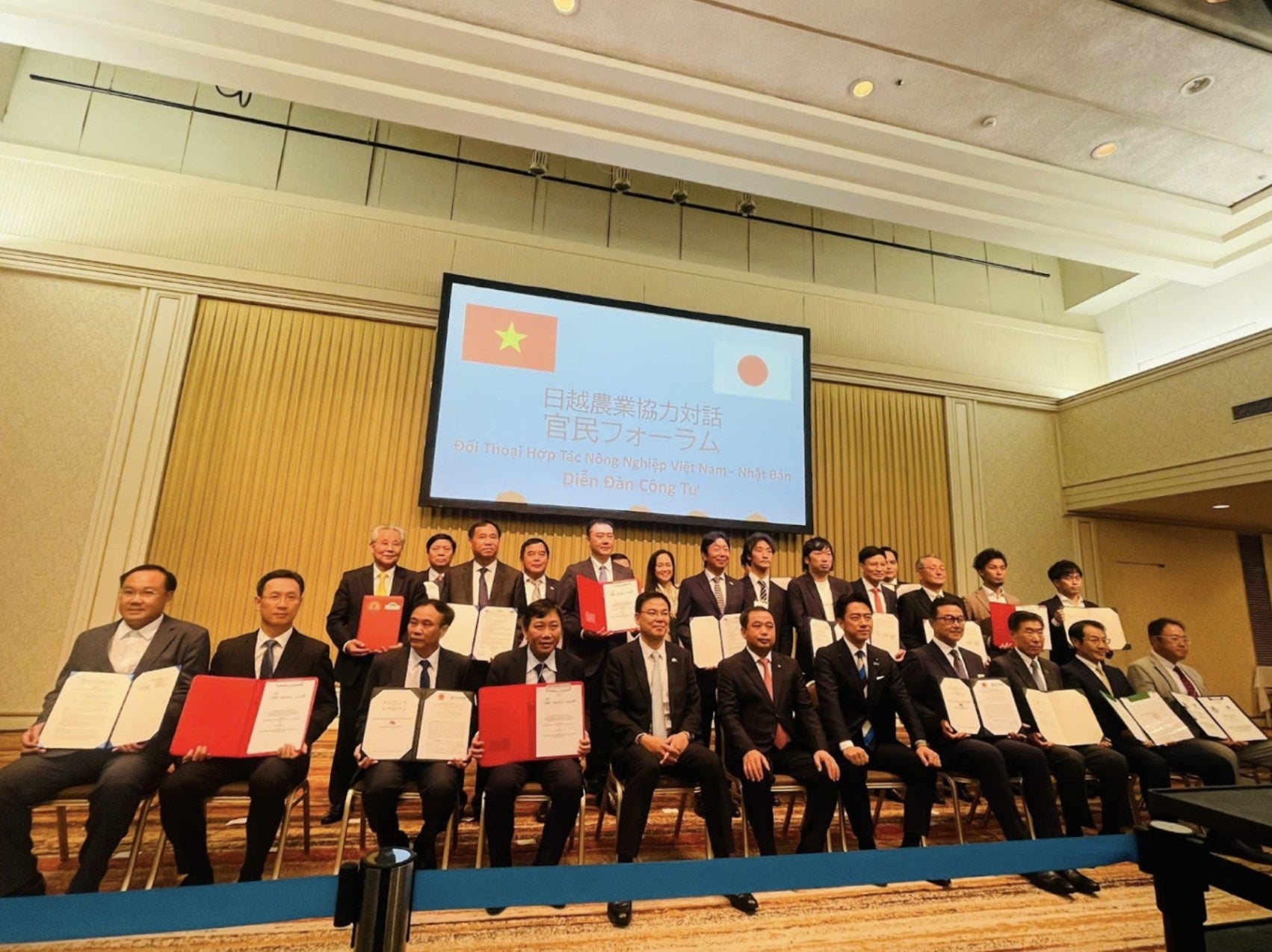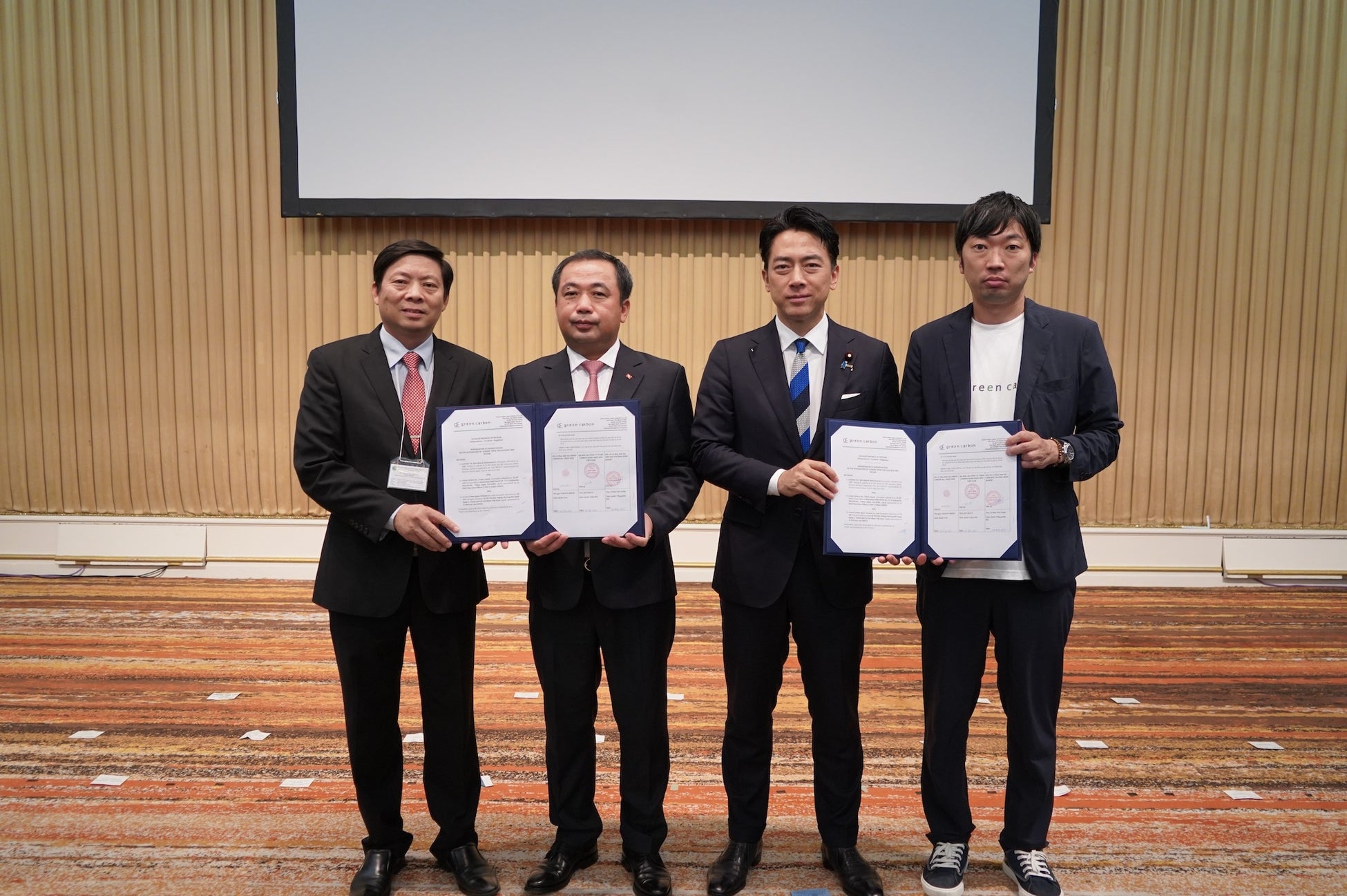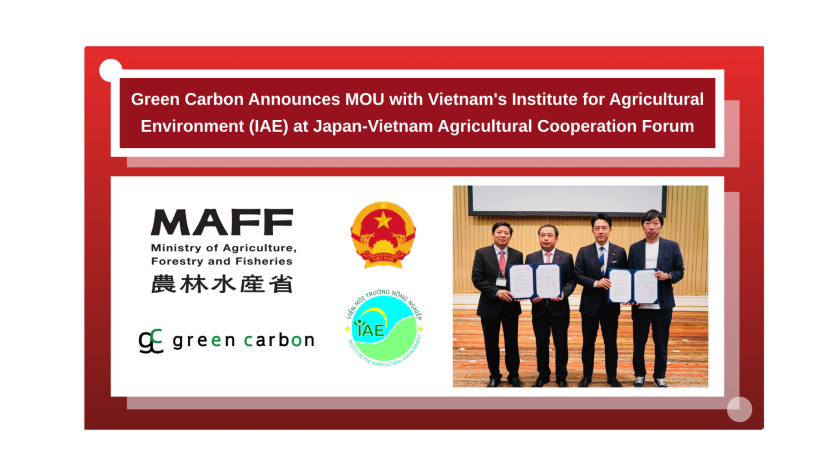Driving Emission Reduction and Agricultural Development in Japan and Vietnam Through Carbon Credits
Green Carbon, inc. (CEO: Jun Okita, hereinafter referred to as Green Carbon), which develops nature-based carbon credit creation and sales businesses, is pleased to announce that it signed a memorandum of understanding (MOU) with the Institute for Agricultural Environment (IAE※1) in the presence of Japan’s Minister of Agriculture, Forestry and Fisheries Koizumi and Vietnam’s Minister of Agriculture and Rural Development Tan on September 4.
The signing took place at the Japan-Vietnam Agricultural Cooperation Public-Private Dialogue Forum (hereinafter, the Forum), which focused on “Promoting Technologies for GHG Emission Reduction, Environmental Impact Reduction, and Productivity Improvement.” Through this MOU, Green Carbon will work with the IAE to reduce greenhouse gas emissions and environmental impact while promoting technology exchange to improve productivity.
At the Forum, 12 MOUs were announced between Japanese and Vietnamese companies and organizations, further strengthening cooperation in the private sector.
〇Press Release of Ministry of Agriculture, Forestry and Fisheries of Japan URL
〇For inquiries regarding this release and further details, please contact:
〇Click here to download the Green Carbon Inc. company profile:
◆About the Forum
| Date | September 4, 2025 |
| Venue | Tokyo Prince Hotel |
| Attendees | Japan: Ministry of Agriculture, Forestry and Fisheries; approximately 70 private companies and organizations Vietnam: Ministry of Agriculture and Rural Development; approximately 12 private companies and organizations |
Both ministers delivered opening remarks at the forum, reporting that the Japan-Vietnam Mid-to-Long-Term Vision for Agricultural Cooperation (Phase 3) had been approved at the Japan-Vietnam Agricultural Cooperation Dialogue high-level meeting held prior to the forum. In addition, 12 memorandums of understanding (MOUs) related to the forum’s theme were announced by Japanese and Vietnamese private companies in the presence of both ministers. This was followed by presentations and a Q&A session on initiatives to build sustainable agriculture and food systems, given by government officials and private companies from both Japan and Vietnam.

◆Details of the MOU
The primary objective of this MOU is to integrate the MRV (*2) system, based on the “Agreen” project, with Vietnam’s national MRV system. This project aims to strengthen the data infrastructure for carbon credits to support Vietnam’s national commitments to combating climate change. Specifically, we will promote collaborative efforts to harmonize a monitoring and reporting framework with Vietnam’s national system, ensuring compliance with government policies and international standards.
Furthermore, Green Carbon is actively introducing emission reduction technologies in the agricultural sector. These include the implementation of Alternate Wetting and Drying (AWD) (*3) methods in rice cultivation, the utilization of biochar, and the enhancement of carbon sequestration through forestry. The company is promoting standardized emission reduction techniques and carbon credit calculation methodologies based on the Joint Crediting Mechanism (JCM) standards. Currently, we are actively expanding 20 emission reduction projects across Vietnam (7 in the North, 5 in the North Central Coast, 1 in the South Central Coast, and 7 in the Mekong Delta).

◆ Future Outlook
Green Carbon’s activities are highly aligned with the work of the Institute for Agricultural Environment. The implementation of this cooperation will expand opportunities to update and advance emission reduction technologies in agricultural production. It will contribute to improving Vietnam’s standards for emissions management, reduction, and carbon credits in compliance with Japan’s JCM system as well as international standards such as VERRA and Gold Standard.
*1: Institute for Agricultural Environment (IAE) A research institution under the Vietnam Academy of Agricultural Sciences (VAAS), established in 2008. Its main functions include developing programs and research plans for the agricultural environment, technology transfer, scientific research and policy recommendations to local governments, monitoring and analyzing agricultural environmental quality, and implementing improvement activities as needed.
*2: MRV An acronym for “Measurement, Reporting, and Verification.” It refers to a three-step process of collecting, compiling, and verifying data on greenhouse gas emissions and environment-related activities. This system ensures the transparency and accuracy of data, playing a crucial role, particularly in the carbon credit market and climate change initiatives.
*3: Alternate Wetting and Drying (AWD) AWD is a water management technique for rice paddies that involves alternating between flooding and drying the field. Compared to continuous flooding, AWD reduces water usage, contributing to the conservation of water resources.
◆Green Carbon Inc.
Representative: Jun Okita, CEO
Founded: 2019
Head Office: Hanzomon PREX North 9F, 2-3-2 Kojimachi, Chiyoda-ku, Tokyo
Business Activities: Carbon credit generation and sales, agricultural-related business, environmental-related business, and other related activities, including ESG consulting
URL : https://green-carbon.co.jp/en/
◆Green Carbon Business Overview
Green Carbon operates with the vision of “Saving the Earth through the power of life,” offering end-to-end support for the creation, registration, and sales of nature-based carbon credits both domestically and internationally. In addition, the company is engaged in agriculture-related businesses, R&D projects, and ESG consulting services.
Its business footprint spans Japan and Southeast Asia, extending to Australia and South America, generating nature-based carbon credits from rice paddies, biochar, forest conservation, carbon farming, mangrove reforestation, and methane reduction from livestock.
In Japan, Green Carbon obtained the first and largest-ever J-Credit certification for rice paddies in 2023 (approximately 6,220 tons), and expanded the project to around 40,000 hectares (about 80,000 tons) in 2024.
Green Carbon also provides “Agreen”, a one-stop platform that streamlines the entire process from credit registration and application to sales, simplifying procedures and documentation while significantly reducing the workload for credit creators.

